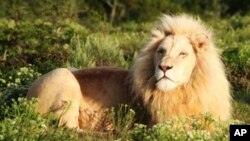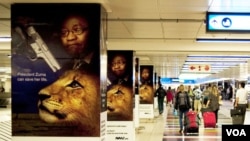A new ad campaign is underway in South Africa to stop the country’s lion bone trade. Lions are killed so their bones can be used to make fake aphrodisiacs and traditional medicines. The demand for the bones is growing in Asia as tigers become scarce.
The campaign’s been launched by Avaaz – a group describing itself as a global web movement, whose name means “voice” in several languages.
The ads can be found in Johannesburg Airport’s International Arrival Hall, the inflight magazine aboard South African Airways and on Google. They’re aimed at stopping what’s known as canned hunting. Lions are born and raised on game farms for the sole purpose of being hunted. Some reports say hunters pay as much as $20,000 to do so.
“South Africa’s lions are being decimated. Trade is exploding right now and experts fear that even wild lions, with only 20,000 left in Africa, are starting to come under poaching attack. This horrific trade could harm South Africa’s tourist industry and its reputation as a wildlife haven unless President Zuma steps in right now to ban the lion bone trade,” said Jamie Choi, Avaaz’s Campaign Director.
Tiger and rhino populations have been hit very hard by poachers seeking to sell bones, horns and hides to the Asian market. Choi said lions are next in line.
“Lion bones are currently used as substitutes for tiger bones, and they’re used to make products like tiger bone wine, which is very popular among wealthy consumers in countries like Vietnam and China. These products are wrongfully believed to be good for arthritis and rheumatism, but also a lot of people carry the superstitious belief that it boosts the sex drive,” she said.
In May, South Africa’s Environment Minister Edna Molewa rejected calls to ban the lion bone trade and said she did not believe it put lions in the wild in danger.
Choi said the new ads are phase two of a global campaign.
“[On] June 27, we launched a global petition campaign urging President Zuma to stop this lion bone trade. And within one month’s time we had over 700,000 people around the world sign this petition. However, we did not receive a response from the environment minister or President Zuma’s office. So we decided to launch a second phase of this campaign to shed light [on] what is happening to the lions of South Africa,” he said.
Not everyone views the issue as cut and dried. Researchers at the University of Pretoria and Sweet Briar College in the U.S. state of Virginia looked into the controversy. Their study said, “The captive-bred lion hunting industry in South Africa has grown rapidly, while the number of wild lions hunted in other African countries has declined.”
They also said that “If captive-bred lion hunting were ever prohibited, a transfer of demand to wild lion hunts could lead to elevated off-takes with negative impacts on wild populations.”
The researchers added, “If there are any future efforts to control the captive-bred lion hunting industry, decision-makers should take cognizance of the potential for increased demand for wild lion trophies and implement steps to prevent excessive harvests. Such steps should include tight restrictions on sustainable harvests, age restrictions on lion trophies, and in South Africa, consideration of implementing buffer zones around parks in which lion hunting is prohibited or strictly controlled.”
The researchers said, however, that further research is “urgently required” to identify potential risks for lion conservation.
The campaign’s been launched by Avaaz – a group describing itself as a global web movement, whose name means “voice” in several languages.
The ads can be found in Johannesburg Airport’s International Arrival Hall, the inflight magazine aboard South African Airways and on Google. They’re aimed at stopping what’s known as canned hunting. Lions are born and raised on game farms for the sole purpose of being hunted. Some reports say hunters pay as much as $20,000 to do so.
“South Africa’s lions are being decimated. Trade is exploding right now and experts fear that even wild lions, with only 20,000 left in Africa, are starting to come under poaching attack. This horrific trade could harm South Africa’s tourist industry and its reputation as a wildlife haven unless President Zuma steps in right now to ban the lion bone trade,” said Jamie Choi, Avaaz’s Campaign Director.
Tiger and rhino populations have been hit very hard by poachers seeking to sell bones, horns and hides to the Asian market. Choi said lions are next in line.
“Lion bones are currently used as substitutes for tiger bones, and they’re used to make products like tiger bone wine, which is very popular among wealthy consumers in countries like Vietnam and China. These products are wrongfully believed to be good for arthritis and rheumatism, but also a lot of people carry the superstitious belief that it boosts the sex drive,” she said.
In May, South Africa’s Environment Minister Edna Molewa rejected calls to ban the lion bone trade and said she did not believe it put lions in the wild in danger.
Choi said the new ads are phase two of a global campaign.
“[On] June 27, we launched a global petition campaign urging President Zuma to stop this lion bone trade. And within one month’s time we had over 700,000 people around the world sign this petition. However, we did not receive a response from the environment minister or President Zuma’s office. So we decided to launch a second phase of this campaign to shed light [on] what is happening to the lions of South Africa,” he said.
Not everyone views the issue as cut and dried. Researchers at the University of Pretoria and Sweet Briar College in the U.S. state of Virginia looked into the controversy. Their study said, “The captive-bred lion hunting industry in South Africa has grown rapidly, while the number of wild lions hunted in other African countries has declined.”
They also said that “If captive-bred lion hunting were ever prohibited, a transfer of demand to wild lion hunts could lead to elevated off-takes with negative impacts on wild populations.”
The researchers added, “If there are any future efforts to control the captive-bred lion hunting industry, decision-makers should take cognizance of the potential for increased demand for wild lion trophies and implement steps to prevent excessive harvests. Such steps should include tight restrictions on sustainable harvests, age restrictions on lion trophies, and in South Africa, consideration of implementing buffer zones around parks in which lion hunting is prohibited or strictly controlled.”
The researchers said, however, that further research is “urgently required” to identify potential risks for lion conservation.





